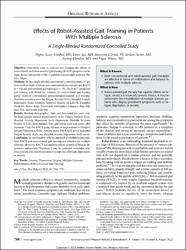| dc.contributor.author | Özsoy Ünübol, Tuğba | |
| dc.contributor.author | Ata, Emre | |
| dc.contributor.author | Cavlak, Müyesser | |
| dc.contributor.author | Demir, Serkan | |
| dc.contributor.author | Candan, Zeynep | |
| dc.contributor.author | Yılmaz, Figen | |
| dc.date.accessioned | 2022-08-05T08:19:38Z | |
| dc.date.available | 2022-08-05T08:19:38Z | |
| dc.date.issued | 2022 | en_US |
| dc.identifier.citation | Özsoy Ünübol, T., Ata, E., Cavlak, M., Demir, S., Candan, Z. ve Yılmaz, F. (2022). Effects of robot-assisted gait training in patients with multiple sclerosis a single-blinded randomized controlled study. American Journal of Physical Medicine & Rehabilitation, 101(8), 768-774. https://doi.org/10.1097/PHM.0000000000001913 | en_US |
| dc.identifier.issn | 0894-9115 | |
| dc.identifier.issn | 1537-7385 | |
| dc.identifier.uri | https://doi.org/10.1097/PHM.0000000000001913 | |
| dc.identifier.uri | https://hdl.handle.net/20.500.12511/9629 | |
| dc.description.abstract | Objective This study aims to evaluate and compare the effects of conventional and robot-assisted gait training (RAGT) programs on fatigue, mood, and quality of life in patients with multiple sclerosis who have fatigue. Methods In this single-blinded, randomized controlled study, 37 patients with multiple sclerosis were randomized into two groups: RAGT (n = 18) and conventional gait training (n = 19). The RAGT group had gait training with RoboGait, whereas the conventional gait training group received conventional physiotherapist-assisted gait training. Outcome measures were the Fatigue Severity Scale, Hospital Anxiety Depression Scale, Multiple Sclerosis Quality of Life-54, Extended Disability Status Scale, Functional Ambulation Category, Berg Balance Test, and 6-min walk test. Results Baseline demographic, clinic, and functional data were similar. Both groups showed improvements in the Fatigue Severity Scale, Hospital Anxiety Depression Scale-Depression, Multiple Sclerosis Quality of Life, Berg Balance Test, and 6-min walk test scores after treatment. Only the RAGT group showed an improvement in Hospital Anxiety Depression Scale-Anxiety score. The RAGT group had better Fatigue Severity Scale, and Hospital Anxiety Depression Scale scores. Conclusion In combination with the standard rehabilitation program, both RAGT and conventional gait training are effective for multiple sclerosis. However, RAGT has superior effects in terms of fatigue, depression, and anxiety. Therefore, it may be preferred in multiple sclerosis patients who exhibit prominent symptoms of fatigue, depression, or anxiety. | en_US |
| dc.language.iso | eng | en_US |
| dc.publisher | Lippincott Williams & Wilkins | en_US |
| dc.rights | info:eu-repo/semantics/embargoedAccess | en_US |
| dc.subject | Anxiety | en_US |
| dc.subject | Depression | en_US |
| dc.subject | Fatigue | en_US |
| dc.subject | Multiple Sclerosis | en_US |
| dc.subject | Rehabilitation | en_US |
| dc.subject | Robot-Assisted Gait Training | en_US |
| dc.title | Effects of robot-assisted gait training in patients with multiple sclerosis a single-blinded randomized controlled study | en_US |
| dc.type | article | en_US |
| dc.relation.ispartof | American Journal of Physical Medicine & Rehabilitation | en_US |
| dc.department | İstanbul Medipol Üniversitesi, Sağlık Bilimleri Enstitüsü, Fizyoterapi ve Rehabilitasyon Ana Bilim Dalı | en_US |
| dc.identifier.volume | 101 | en_US |
| dc.identifier.issue | 8 | en_US |
| dc.identifier.startpage | 768 | en_US |
| dc.identifier.endpage | 774 | en_US |
| dc.relation.publicationcategory | Makale - Uluslararası Hakemli Dergi - Kurum Öğretim Elemanı | en_US |
| dc.identifier.doi | 10.1097/PHM.0000000000001913 | en_US |
| dc.institutionauthor | Cavlak, Müyesser | |
| dc.identifier.wosquality | Q1 | en_US |
| dc.identifier.wos | 000827891800013 | en_US |
| dc.identifier.scopus | 2-s2.0-85134854300 | en_US |
| dc.identifier.pmid | 34686632 | en_US |
| dc.identifier.scopusquality | Q1 | en_US |


















